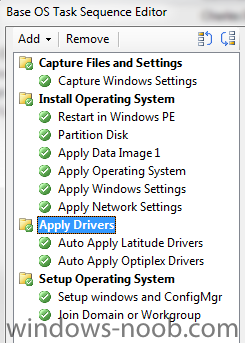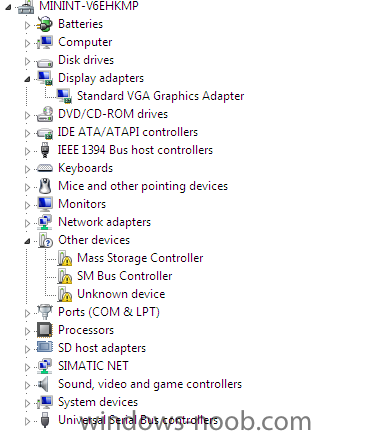
labguy
Established Members-
Posts
11 -
Joined
-
Last visited
Everything posted by labguy
-
D'oh! Oh well, none of the other threads with this problem got solved, so hopefully this will be useful to someone else. Thanks!
-
I'm trying to create a package that just copies a few files, but no matter what I do in SCCM, it fails with exit code 4. Here's what I want to do: xcopy "\\server\path\to\foo\*" "C:\Users\Public\Desktop\Foo\" /E /Y /C /I Here's what I've tried: Run it myself - Works Put it in a batch script that creates C:\Users\Public\Desktop\Foo before running xcopy. Foo gets created but xcopy fails. Run that batch script myself - Works Uncheck "contains source files" and drop xcopy directly into the command line - fails Create an everyone-full control folder on C:\ and tell SCCM to xcopy cmd.exe to C:\Folder - Works xcopy \\server\...\foo\* C:\Folder - fails I have the task set to run whether or not someone is logged in, but it's almost as if xcopy is ignoring it and refuses to write the files. I've also tried to use robocopy, but the advertisement has stopped updating on the client. Wait, actually it looks like it requires a machine policy force, a reboot and 10 minutes to update. That can't be right. How do I make the client update faster? I've spent two whole days troubleshooting this mess. It shouldn't be this hard to copy a folder. Edit: Ok, so it finally updated to use robocopy, but that's failing with error 16: insufficient privileges.
-
I'm testing a new task sequence, but it keeps failing for various reasons. Each time it fails, it wants to reboot. Is it possible to restart the Task Sequence Wizard from the debug console without rebooting? The closest I can get is X:\sms\bin\i386\TsBootShell.exe, but that just pops up a window that says "Windows is starting up" and then goes away. Thanks. Edit: Oh, crap I'm an idiot. I just deleted the wrong task sequence. Is there a recycle bin somewhere that I can restore it from before it gets permanently deleted? Yay monday!
-
Driver package skips some drivers
labguy replied to labguy's question in Deploy software, applications and drivers
Hmm, maybe I'm applying the drivers in the wrong step? Still can't find any relevant logs. FWIW, here are the missing drivers: E5520 Video Chipset Storage FreeFall sensor Edit: Playing around with the location of the Apply Drivers step within the task sequence caused an 0x32 permission denied error, but it didn't reboot. Instead the TS failed and let me log in. I checked the device manager and the same ones are missing which means that *none* of the drivers from the package are being installed. I guess I need to re-redo my driver database again. What are some best practices for creating a driver database? We have 12 models of desktops/laptops (from GX520's to 790's and E55XX and I'm not sure if I should be specifying 32/64 bit driver packages. Because we don't restrict OSD to certain models, it is likely that any of our task sequences could be deployed to any model PC. I'd really rather not have to maintain 12 (or 24) conditional statements and the entire reason that I trashed our driver database is because when it was all one giant package, the E5520 drivers started corrupting some of the older desktops. I read a bunch of posts about how it's should be done, but I'm a visual person. Would someone mind posting some screenshots of their driver store/packages? Thanks. -
Driver package skips some drivers
labguy replied to labguy's question in Deploy software, applications and drivers
There's only one driver in that storage folder and SCCM wouldn't let me import it because it already exists. My driver packages don't appear to be missing any drivers, but I didn't have the option to allow unsigned drivers in my task. I'll enable this and try again, thanks. Edit: it didn't work. -
Driver package skips some drivers
labguy replied to labguy's question in Deploy software, applications and drivers
I found this in SMSTS-<date>.log but it doesn't give anything helpful either. Processing group TSManager 3/1/2012 12:33:02 PM 5384 (0x1508) Parsing group node: Apply Drivers TSManager 3/1/2012 12:33:02 PM 5384 (0x1508) Description: TSManager 3/1/2012 12:33:02 PM 5384 (0x1508) ContinueOnError: TSManager 3/1/2012 12:33:02 PM 5384 (0x1508) Disable: TSManager 3/1/2012 12:33:02 PM 5384 (0x1508) (__hrMethodRetVal == ((HRESULT)0L)) || (bFailIfMissing == false), HRESULT=80070002 (e:\nts_sms_fre\SMS\common\inc\ccmxml.h,566) TSManager 3/1/2012 12:33:02 PM 5384 (0x1508) No condition is associated with the step. TSManager 3/1/2012 12:33:02 PM 5384 (0x1508) Adding begin group instruction at 12 TSManager 3/1/2012 12:33:02 PM 5384 (0x1508) There are 2 first level steps or groups TSManager 3/1/2012 12:33:02 PM 5384 (0x1508) Parsing step node: Auto Apply Latitude Drivers TSManager 3/1/2012 12:33:02 PM 5384 (0x1508) Description: TSManager 3/1/2012 12:33:02 PM 5384 (0x1508) ContinueOnError: TSManager 3/1/2012 12:33:02 PM 5384 (0x1508) SuccessCodeList: 0 TSManager 3/1/2012 12:33:02 PM 5384 (0x1508) A condition is associated with the step found TSManager 3/1/2012 12:33:02 PM 5384 (0x1508) Found and operator. TSManager 3/1/2012 12:33:02 PM 5384 (0x1508) There are 1 operands TSManager 3/1/2012 12:33:02 PM 5384 (0x1508) **Processing expression node TSManager 3/1/2012 12:33:02 PM 5384 (0x1508) Found SMS_TaskSequence_WMIConditionExpression expression. TSManager 3/1/2012 12:33:02 PM 5384 (0x1508) **In ProcessBuiltInCondition node: expression TSManager 3/1/2012 12:33:02 PM 5384 (0x1508) There are 2 operands in the built in action TSManager 3/1/2012 12:33:02 PM 5384 (0x1508) Operand Namespace=root\cimv2 TSManager 3/1/2012 12:33:02 PM 5384 (0x1508) Operand Query=select * from Win32_ComputerSystem where Model like '%Latitude%' TSManager 3/1/2012 12:33:02 PM 5384 (0x1508) Successfully added 3 condition parameters TSManager 3/1/2012 12:33:02 PM 5384 (0x1508) Disable: TSManager 3/1/2012 12:33:02 PM 5384 (0x1508) Start in dir: TSManager 3/1/2012 12:33:02 PM 5384 (0x1508) Run in attribute: WinPE TSManager 3/1/2012 12:33:02 PM 5384 (0x1508) Timeout: TSManager 3/1/2012 12:33:02 PM 5384 (0x1508) DefaultVarlist found TSManager 3/1/2012 12:33:02 PM 5384 (0x1508) Variable name: OSDAutoApplyDriverBestMatch TSManager 3/1/2012 12:33:02 PM 5384 (0x1508) Variable name: OSDAutoApplyDriverCategoryList TSManager 3/1/2012 12:33:02 PM 5384 (0x1508) Variable name: OSDAllowUnsignedDriver TSManager 3/1/2012 12:33:02 PM 5384 (0x1508) Action command line: osddriverclient.exe /auto /bestmatch:%OSDAutoApplyDriverBestMatch% /unsigned:%OSDAllowUnsignedDriver% TSManager 3/1/2012 12:33:02 PM 5384 (0x1508) Adding instruction at 13 TSManager 3/1/2012 12:33:02 PM 5384 (0x1508) Parsing step node: Auto Apply Optiplex Drivers TSManager 3/1/2012 12:33:02 PM 5384 (0x1508) Description: TSManager 3/1/2012 12:33:02 PM 5384 (0x1508) ContinueOnError: TSManager 3/1/2012 12:33:02 PM 5384 (0x1508) SuccessCodeList: 0 TSManager 3/1/2012 12:33:02 PM 5384 (0x1508) A condition is associated with the step found TSManager 3/1/2012 12:33:02 PM 5384 (0x1508) Found and operator. TSManager 3/1/2012 12:33:02 PM 5384 (0x1508) There are 1 operands TSManager 3/1/2012 12:33:02 PM 5384 (0x1508) **Processing expression node TSManager 3/1/2012 12:33:02 PM 5384 (0x1508) Found SMS_TaskSequence_WMIConditionExpression expression. TSManager 3/1/2012 12:33:02 PM 5384 (0x1508) **In ProcessBuiltInCondition node: expression TSManager 3/1/2012 12:33:02 PM 5384 (0x1508) There are 2 operands in the built in action TSManager 3/1/2012 12:33:02 PM 5384 (0x1508) Operand Namespace=root\cimv2 TSManager 3/1/2012 12:33:02 PM 5384 (0x1508) Operand Query=select * from Win32_ComputerSystem where Model like '%Optiplex%' TSManager 3/1/2012 12:33:02 PM 5384 (0x1508) Successfully added 3 condition parameters TSManager 3/1/2012 12:33:02 PM 5384 (0x1508) Disable: TSManager 3/1/2012 12:33:02 PM 5384 (0x1508) Start in dir: TSManager 3/1/2012 12:33:02 PM 5384 (0x1508) Run in attribute: WinPE TSManager 3/1/2012 12:33:02 PM 5384 (0x1508) Timeout: TSManager 3/1/2012 12:33:02 PM 5384 (0x1508) DefaultVarlist found TSManager 3/1/2012 12:33:02 PM 5384 (0x1508) Variable name: OSDAutoApplyDriverBestMatch TSManager 3/1/2012 12:33:02 PM 5384 (0x1508) Variable name: OSDAutoApplyDriverCategoryList TSManager 3/1/2012 12:33:02 PM 5384 (0x1508) Variable name: OSDAllowUnsignedDriver TSManager 3/1/2012 12:33:02 PM 5384 (0x1508) Action command line: osddriverclient.exe /auto /bestmatch:%OSDAutoApplyDriverBestMatch% /unsigned:%OSDAllowUnsignedDriver% TSManager 3/1/2012 12:33:02 PM 5384 (0x1508) Adding instruction at 14 TSManager 3/1/2012 12:33:02 PM 5384 (0x1508) Processed all elements TSManager 3/1/2012 12:33:02 PM 5384 (0x1508) What's the deal here? Even my E5510's are skipping drivers now, which they weren't before I wiped out the catalog. -
Driver package skips some drivers
labguy replied to labguy's question in Deploy software, applications and drivers
Found this http://blogs.msdn.com/b/lxchen/archive/2009/04/03/a-list-of-sccm-log-files.aspx, but it isn't exactly helping. I don't see any relevant reports either. -
Driver package skips some drivers
labguy posted a question in Deploy software, applications and drivers
I'm trying to push Windows 7 to an E5520 but it is skipping 4 drivers seen here: If I right click and do Update > Browse > \\server\drivers\Latitude\E5520 they install just fine (but I can't tell which specific driver it uses). While I don't have individual packages for each model, I do have separate ones for Latitude, Optiplex, etc. I got the system cabs from Dell and uploaded all the drivers at the same time and added the packages to the distribution point so this means we know a few things: The actual driver inf's are on the server They exist in the package (once I install them I can see the names, driver version, etc and can point to them in SCCM) Because they exist in the package, they exist on the DP (we only have 1 DP anyway). I tried RunDll32.exe Syssetup.dll,UpdatePnpDeviceDrivers like it says in one of the other threads, but that is XP-only. I tried pnputil, but there are a *lot* of drivers in that cab and I don't think I should have to track them down like this. I'm missing something simple, but I don't know what. Which log file do driver install errors go in? Is there some way to perform a PNP scan and tell it which folder to look in? FWIW, I just dumped the cabs into their default folder structure on the server, so it imported duplicates, multiple versions and x86/x64 for each model: \\server\Drivers\Latitude\E5520\E5520-win7-A03-R316474\E5520\win7\x86\chipset -
Deploying applications with batch scripts
labguy replied to labguy's question in Deploy software, applications and drivers
Thanks, that's a very good point I had not thought of. After playing around with software deployments I have figured out why I was concerned about this in the first place. On the Package Properties under the Reporting tab there is an option for "Use package properties for status MIF matching." I have been completely ignoring this step because I don't know what it is. What is MIF matching and does it matter if I completely ignore it? -
I realize that this is an old thread but since it's the only one in the Capturing category of the thread that's pinned to the top of the board I figured I'd just say that I figured out a way around the auto-login registry hack. I just kicked off the task, waited for it to reboot and logged in manually. The sequence picked right up and finished the job.
-
Deploying applications with batch scripts
labguy posted a question in Deploy software, applications and drivers
I'm having to train myself so I may be over-thinking this, but I was wondering what effect batch scripts have on reporting in SCCM 2007. It seems like SCCM gathers some information about the install from the command line used for the package's program, but I don't know why I think that and I can't find any information about it. For example: I want to deploy Putty, but its setup does not create a desktop icon (which my users complain when they can't find). Instead of putting `puttysetup.exe /silent` on the command line in SCCM, my program runs a batch script that calls the silent setup and then copies a shortcut from a network share. The user is completely unaware and as far as the computer is concerned, the program gets installed correctly and the shortcut gets created. I'm specifically curious as to what difference this makes on SCCM. Thanks.



